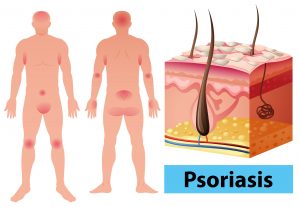
Psoriasis is a skin disease that causes a rash with itchy, scaly patches, most commonly on the knees, elbows, trunk, and scalp.
Psoriasis is a common, long-term (chronic) disease with no cure. It can be painful, interfere with sleep, and make it hard to concentrate. The condition tends to go through cycles, flaring for a few weeks or months, then subsiding for a while. Common triggers in people with a genetic predisposition to psoriasis include infections, cuts or burns, and certain medications.
Symptoms
- A patchy rash that varies widely in how it looks from person to person, ranging from spots of dandruff-like scaling to significant eruptions over much of the body
- Rashes that vary in color, tending to be shades of purple with a gray scale on brown or Black skin and pink or red with a silver scale on white skin
- Small scaling spots (commonly seen in children)
- Dry, cracked skin that may bleed
- Itching, burning, or soreness
- Cyclic rashes that flare for a few weeks or months and then subside
Psoriasis triggers
Many people predisposed to psoriasis may be free of symptoms for years until some environmental factor triggers the disease. Common psoriasis triggers include:
- Infections, such as strep throat or skin infections
- Weather, especially cold, dry conditions
- Injury to the skin, such as a cut or scrape, a bug bite, or a severe sunburn
- Smoking and exposure to secondhand smoke
- Heavy alcohol consumption
- Certain medications — including lithium, high blood pressure drugs, and antimalarial drugs
- Rapid withdrawal of oral or injected corticosteroids
Treatment
Psoriasis treatments aim to stop skin cells from proliferating and remove scales. Options include creams and ointments (topical therapy), light therapy (phototherapy), and oral or injected medications.
Which treatments you use depends on how severe the psoriasis is and how responsive it has been to previous treatment and self-care measures. You might need to try different drugs or a combination of treatments before you find an approach that works. Even with successful treatment, usually, the disease returns.
0 Comments